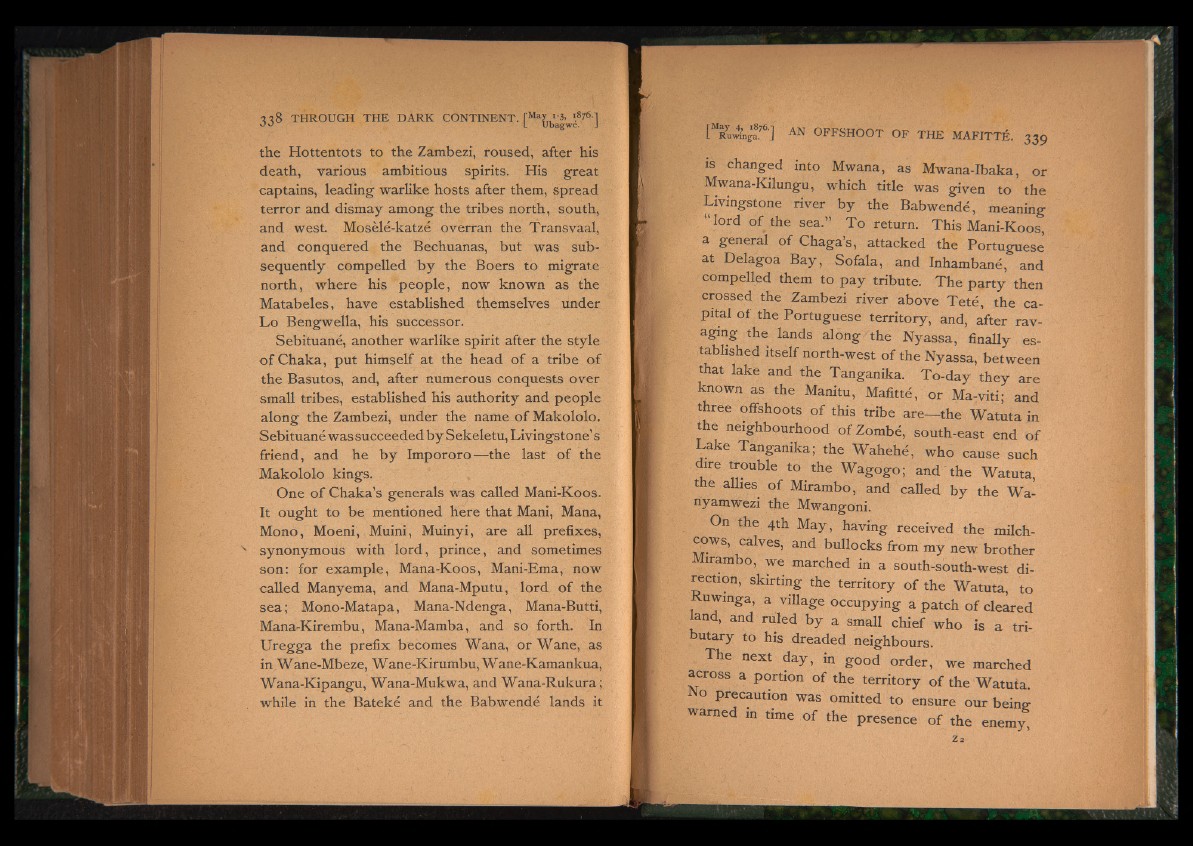
the Hottentots to the Zambezi, roused, after his
death, various ambitious spirits. His great
captains, leading warlike hosts after them, spread
terror and dismay among the tribes north, south,
and w e s t Mosele-katze overran the Transvaal,
and conquered the Bechuanas, but was subsequently
compelled b y the Boers to migrate
north, where his people, now known as the
Matabeles, have established themselves under
L o Bengwella, his successor.
Sebituane, another warlike spirit after the style
o fC h a k a , put himself at the head o f a tribe o f
the Basutos, and, after numerous conquests over
small tribes, established his authority and people
along the Zambezi, under the name o f Makololo.
Sebituane was succeeded b y S ekeletu, Livingst o ne’s
friend, and he b y Impororo— the last o f the
Makololo kings.
One o f Chaka’s generals was called Mani-Koos.
It ought to be mentioned here that Mani, Mana,
Mono, Moeni, Muini, Muinyi, are all prefixes,
synonymous with lord, prince, and sometimes
son: for example, Mana-Koos, Mani-Ema, now
called Manyema, and Mana-Mputu, lord o f the
sea; Mono-Matapa, Mana-Ndenga, Mana-Butti,
Mana-Kirembu, Mana-Mamba, and so forth. In
U reg g a the prefix becomes Wana, or Wane, as
in Wane-Mbeze, Wane-Kirumbu, Wane-Kamankua,
Wana-Kipangu, Wana-Mukwa, and Wana-Rukura;
while in the Bateke and the Babwende lands it
is changed into Mwana, as Mwana-Ibaka, or
Mwana-Kilungu, which title was given to the
Livingstone river b y the Babwende, meaning
“ lord o f the sea.” T o return. This Mani-Koos,
a general o f C h a g a s , attacked the Portuguese
at Delagoa B a y , Sofala, and Inhambané, and
compelled them to p a y tribute. The p a rty then
crossed the Zambezi river above T e té , the capital
o f the Portuguese territory, and, after ravaging
the lands along the Nyassa, finally established
itself north-west o f the Nyassa, between
that lake and the Tanganika. To-day th ey are
known as the Manitu, Mafitté, or Ma-viti; and
three offshoots o f this tribe are— the Watuta in
the neighbourhood o f Zombé, south-east end o f
Lake Tanganika; the Wahehé, who cause such
dire trouble to the W a g o g o ; and the Watuta,
the allies o f Mirambo, and called b y the Wa-
riyamwezi the Mwangoni.
On the 4th May, having received the milch-
cpws, calves, and bullocks from my new brother
Mirambo, we marched in a south-south-west direction,
skirting the territory o f the Watuta, to
uwinga, a village occupying a patch o f cleared
land, and ruled b y a small chief who is a tributary
to his dreaded neighbours.
T he next d a y , in good order, we marched
across a portion o f the territory o f the Watuta.
o Precaution was omitted to ensure our beine-
warned in time o f the presence o f the enemy,